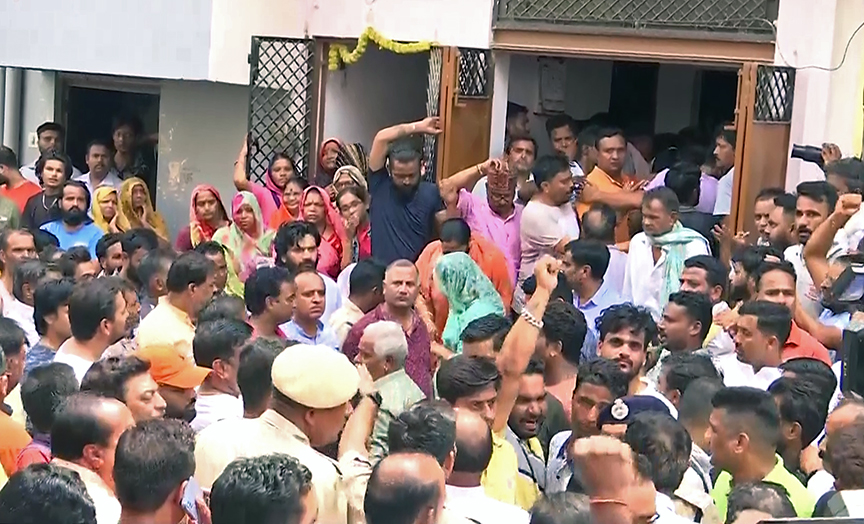It is a sign of our times, especially in India with its 1.3 billion plus population, that each and every issue can be converted into a controversy that spills over into violence and destruction of property. The last decade, or most specifically since 2014, when the BJP-led NDA registered a thumping victory in the national elections, certain vested interests, who had lost power, deliberately started creating tensions in society to stoke such violence, at times with finances received from sources outside the country.
Communal tensions were repeatedly created on fake narratives, in a bid to divide communities. The falsehood spread on attacks on churches in 2015 is but a case in point. As also the isolated cases
It is in the above light that the recent controversy over the remarks of Ms Nupur Sharma have to be seen. In end May, a TV debate on the Shiva Lingam found at the Krishna Janambhumi turned into a slanging match in which a panelist referred to Lord Shiva in objectionable terms. In response, Ms Sharma, who was the spokesperson of the ruling BJP dispensation, made comments about Islam that went way beyond her brief. The issue would probably have died down there, but a few groups took up the matter, leading to protests across India and in some of the Islamic countries in the Gulf. The BJP spokesperson was suspended on 7 June, but the protests continued.
The controversy over the comments made by the spokesperson refuses to die down. Here too, vested interests are fuelling the controversy. Death threats were issued to Sharma by radicalised groups and a host of cases were filed against her in opposition ruled states for creating religious discord. The people who filed complaints against Ms Sharma did not file cases against the panelist who was the initial provocateur. Street protests continued, with a tailor being murdered in Udaipur on 28 June for supporting Nupur. Another murder took place earlier on 21 June, when Umesh Kohle, a chemist was stabbed to death in Maharashtra’s Amravati district for supporting Nupur in a Facebook post. Numerous other people have received death threats merely for supporting Nupur, which activity is an infringement of their right to free speech.
The spate of criminal cases registered against Nupur Sharma from across the country got her to approach the Apex Court, with a prayer to club all the FIRs registered against her. The two-judge vacation bench of the Supreme Court rejected her appeal in a terse one-line order on 1 July, and made scathing verbal comments against her, which set off a fresh round of controversy.
Coming down heavily on Nupur Sharma, Justices Surya Kant and J.B. Pardiwala faulted Sharma for “igniting emotions” and held her responsible for “what is happening” in the country. This prompted a group of Concerned Citizens to dash off an open letter on the issue, seeking repeal of these remarks. But there is a larger issue, which is involved here, and these concerns ought not to be brushed aside.
I am not looking into the legal argument, which is more a matter for trained and experienced lawyers. Of great concern is an issue equally fundamental. Can Nupur Sharma, because of her remarks, be held solely accountable for creating mayhem in the country? That belies the very nature of the radicalised mindset. It was sometime in the 1960s that radicalism started growing in Kashmir, which led to the tragic genocide of Kashmiri Hindus in 1990. This radicalisation, promoted by funds received from the Gulf countries, was not confined to Kashmir alone but encompassed many other parts of India and has now also become a threat to those very countries which spread such a discourse, besides being a threat to India. So to castigate the former BJP spokesperson as the sole cause of violence in India was perhaps going a bit too far.
But the more worrying aspect of the obiter dicta is the interpretation being given to it by radicalised groups in the major minority community. They are claiming it to be a justification delivered by the Apex Court for the calls being given by some of these groups to behead Ms Sharma. This was surely far from the intent of the learned Justices, who in open court commented on the former BJP spokesperson’s appeal to club all cases filed across the country to a single court, given the security risk that she was facing. That the threat cannot be taken lightly is seen by the brutal murders committed by fanatics on those who supported Nupur Sharma in online posts. The effort of fringe groups to wrongly use any obiter dicta as a justification for committing heinous crimes must be condemned, including by the apex court.
Ian Fleming, the celebrated author and creator of James Bond, speaks of the Double-O prefix given to certain secret agents as the Licence to Kill. There is no and never can there be any “licence to kill” by radicalised fringe elements in society.
The author is a retired Major General of the Indian Army. He is currently, Director, India Foundation.

